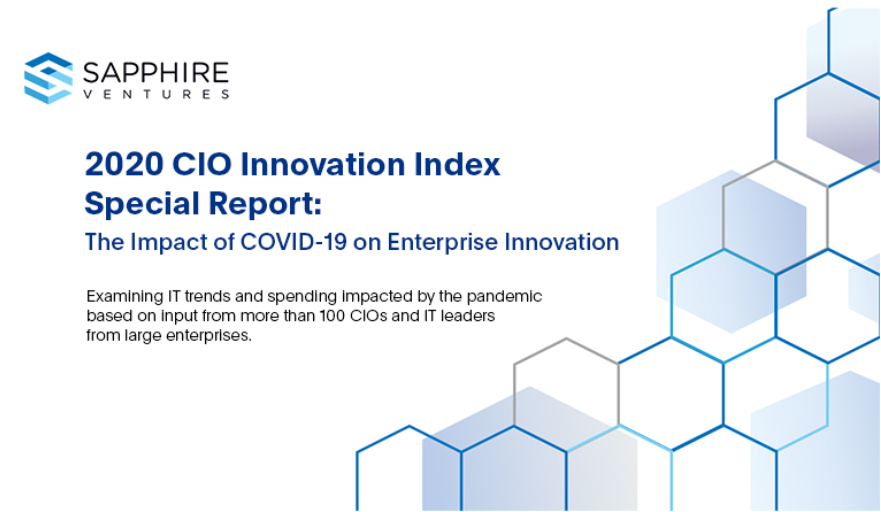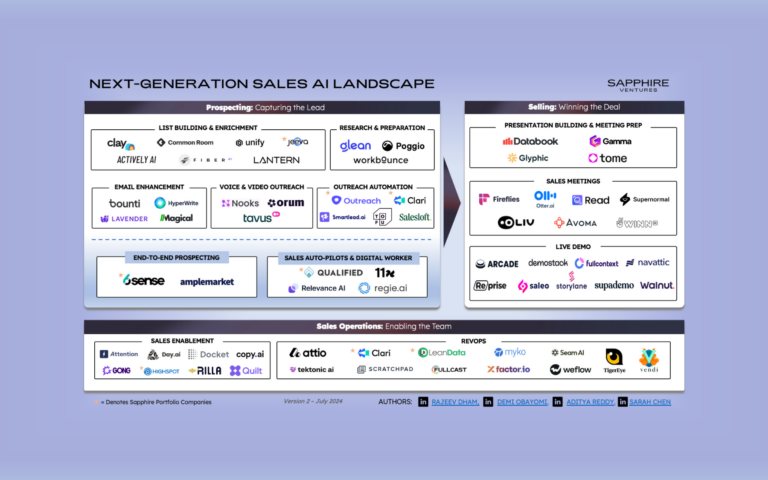Earlier this year, Sapphire Ventures conducted its second annual CIO Innovation Index survey, which explores how CIOs and IT decision makers are adopting emerging technologies and engaging with venture-backed startups. The first edition of the CIO Innovation Index released last September was our first-ever study to capture how enterprise IT leaders interact with startups. This year, we’ve built on that foundation by collecting year-over-year data, and diving deeper into areas such as the proof-of-concept process.
Because we fielded our survey as COVID-19 began to emerge as a global threat, we asked questions specific to the pandemic to understand how enterprise IT organizations have been grappling with the changing environment, and the impact on startup engagement. Ahead of our 2020 CIO Innovation Index to be released next month, today we’re releasing our CIO Innovation Index Special Report: The Impact of COVID-19 on Enterprise Innovation. Based on input from more than 100 CIOs and IT executives from large enterprises, the report examines IT trends and spending driven by the pandemic. Here are the major takeaways:
Despite uncertainty, budgets remain steady as spend shifts to critical technologies
The CIOs and IT leaders who responded to our survey anticipate IT vendor spend to stay constant (46 percent) or increase (40 percent), with the remainder expected to decrease spend in 2020. Part of the optimism in these numbers can be attributed to demographics. About half of our respondents work for companies within recession-resistant industries such as healthcare, government, telecommunications and education, which analysts cite will increase IT spend. In addition, 94 percent of respondents work for companies with more than 5,000 employees. Due to their larger reserves, these companies are less likely to reduce IT spend.
While our data shows that IT budgets aren’t shrinking for many CIOs, spend allocation is quickly shifting. CIOs and IT decision makers report plans to reduce investments in legacy modernization, hardware, recruiting and “non-essential” technologies. On the other hand, cybersecurity, automation, collaboration tools and cloud computing technologies are seeing an increase in spend. These trends are in line with what we’ve been hearing from the 50+ CIOs that we’ve spoken with over the last few months.
CIOs are prioritizing digitization initiatives due to COVID-19
According to McKinsey, COVID-19 has become a major catalyst for the continued and, in some cases, accelerated digitization of companies worldwide. Our special report finds that 64 percent of respondents have plans to stay on track with or increase their digital transformation initiatives in 2020.
For those CIOs who are accelerating digitization projects, the primary focus has been on improving customer-centric operations and IT capabilities. As companies look to deliver fast, personalized and seamless customer support, and to enable a remote workforce almost overnight, IT, sales and marketing, and customer support are the top three areas of accelerating digitization for those surveyed.
CIOs are eager to work with startups, most feel they’ve been key to remote work
The CIO Innovation Index is an important measure used to determine how interested and willing enterprises are to work with innovative startups. We recognize that COVID-19 has caused companies and their IT organizations to pivot their strategies and investments, which has a direct impact on startup adoption.
As investors of companies of consequence, we were pleased to find that 85 percent of enterprise leaders are equally or more likely to work with startups since the onset of the pandemic. Startups are viewed as a critical component to achieve digital transformation, which has been more important than ever. Furthermore, startups that have enabled tighter security and improved collaboration, for example, have played an important role in the move to remote work for a majority (76 percent) of companies.
Access the Special Report: The Impact of COVID-19 on Enterprise Innovation
The Special Report reflects our findings on the early impact of COVID-19 on enterprise innovation. We’re looking forward to releasing our full 2020 CIO Innovation Index in early September.
- Download the Special Report: The Impact of COVID-19 on Enterprise Innovation
- Check out the 2019 CIO Innovation Index to compare findings
- Follow Sapphire Ventures on Twitter and like us on LinkedIn



